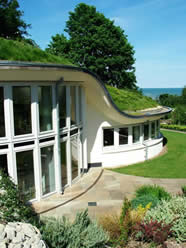The Bay Trust
The Bay Trust began life in 1971 when Fred Cleary created a 6-acre green space called the Pines Garden, dedicated to preserving the natural environment and providing an educational resource for all to enjoy.
This venture soon expanded to include Rippledown in the neighbouring village of Ringwould that became established as an environmental educational centre for children. The original ethos of The Bay Trust continues today. |
 |
Adjacent to the Pines Garden is a museum with displays on environmental themes and local history whilst the Garden also offers a sustainability trail designed to engage and educate children and other visitors. One of the most impressive features of The Bay Trust today is the Pines Calyx, an inspirational training and conference space. It stands as a monument to the goals and values of the modern day organisation whilst also reflecting its strong historical connections. |
|
The Trust embarked upon the creation of Pines Calyx with the intention of achieving multiple objectives simultaneously – to create revenue, to act as an exemplar for environmental design, to act as a resource for environmental education, to provide community benefit and to demonstrate aesthetic quality alongside healthy ergonomics. Completed in 2006, the centre offers a delightful space with some very intriguing and impressive features Amongst the intriguing features is a catalan vaulted roof. An ancient technique that had fallen into disuse for eighty years, the technique was chosen for its ability to greatly reduce the need for reinforced concrete and has since found its way on to other significant buildings around the world. This is just one of the ways in which the designers, builders and others in the project team were able to ensure that the energy used in the building process was vastly reduced (an 80% reduction over conventional construction materials). In addition to this, the operational energy requirement is 66% lower than UK best practice and is shortly to reach beyond ‘zero carbon’, with new technologies to be integrated within the building systems, enabling it to be a net renewable energy exporter. This, along with the achievement of all of the other objectives of the project, is a significant success and is a result of a unique combination of skills applied. Alongside the specific knowledge needed, such as building design, were applied smart approaches to project management and risk management. To begin with an interdisciplinary team came together under a flat hierarchy where all could contribute freely and equally with ideas for improvement to design and construction. This created a feeling of ownership amongst all participants and produced a commitment on a par with that seen in employee owned businesses. Already the social enterprise values of The Bay Trust were building themselves into the new centre. Next, recognising the experimental nature of the project, creativity was supported by a strong risk management strategy, with tried and tested solutions held in reserve. Also supportive of the entrepreneurial nature of the project was the decision to raise finance independently of public funding. The Bay Trust raised funds internally and supplemented this with loan finance from Big Issue Invest. This strong business sense propelled the Pines Calyx project to its successful conclusion, finishing on time and within budget. Nevertheless, other key skills accumulated throughout a long history as a charitable trust were not forgotten. The project ended with a first rate evaluation of the objectives it set out to achieve and this ability to articulate the impact of the project has in turn contributed to replication, with similar sustainable enterprise projects subsequently being created in Kent and Sussex. |
|
| More social enterprise case studies | |

